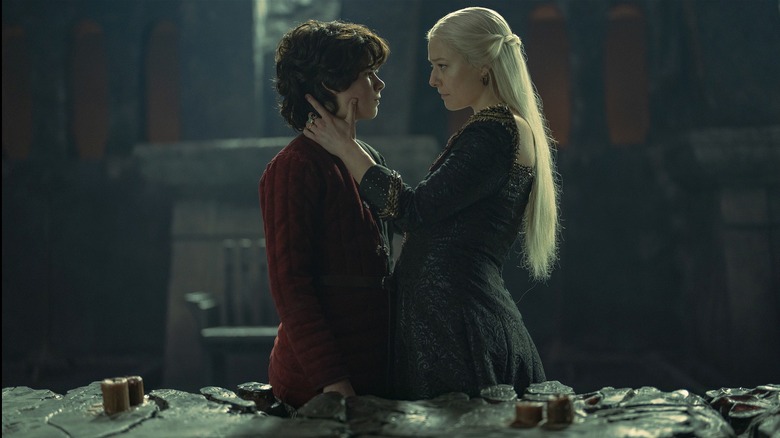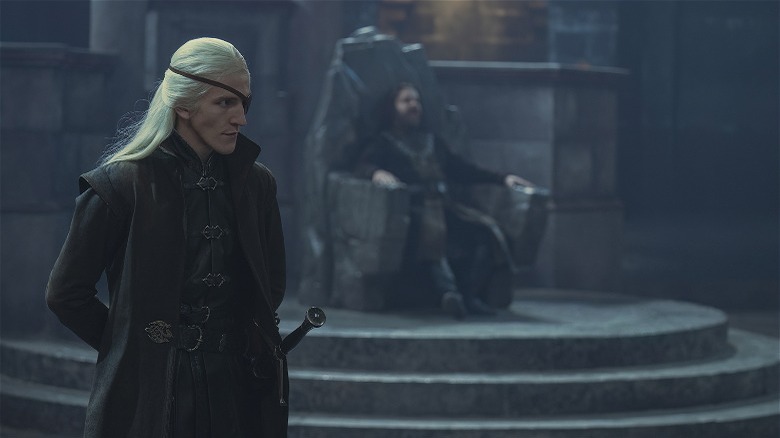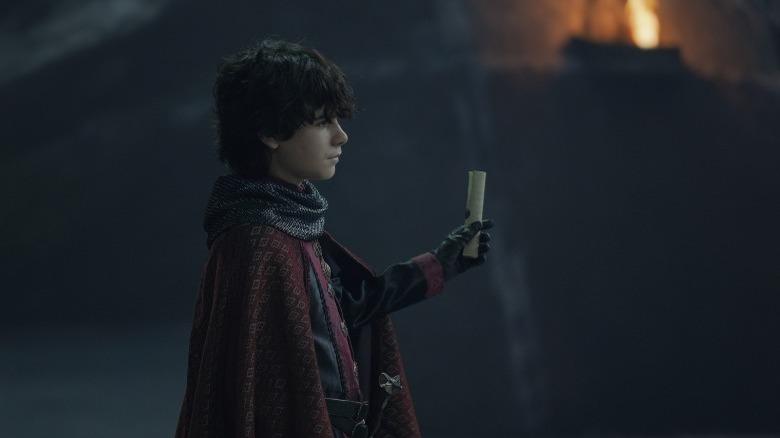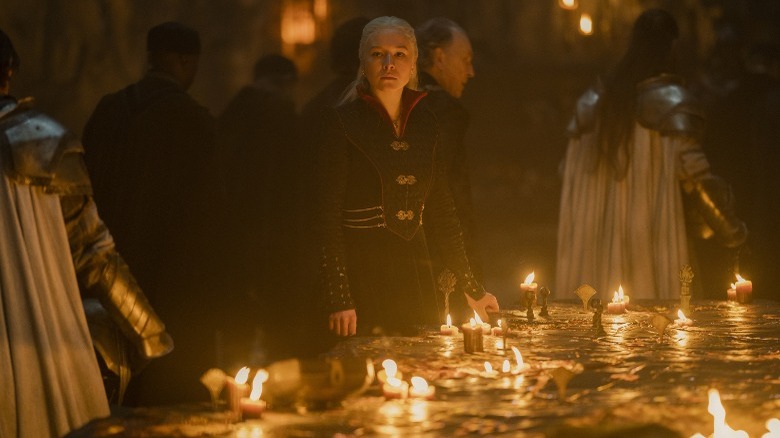House Of The Dragon's Big Death Scene Was Brutal, Avoidable, And Petty – And Therefore, Perfect
This post contains spoilers for the season finale of "House of the Dragon."
In true "Game of Thrones" tradition, "House of the Dragon" ended its first season with a brutal, unexpected death. The decision to close out the tense events of the season with the death of a child surely ramps up the anticipation for season 2, especially due to the fact that this major character death will directly impact the fate of the Seven Kingdoms. Although perfectly avoidable and heartbreaking, the death of Lucerys (Elliot Grihault) perfectly encapsulates the show's spirit and its commitment to telling a tragic tale about familial conflict and thirst for power.
To quickly recap what happened: Lucerys arrives at Storm's End with a message for Borros Baratheon but finds Aemond (Ewan Mitchell) already present. Even after Lucerys is humiliated by Borros and provoked by Aemond, the kid declares that he's only a messenger and intends to get the hell out of there on his dragon, Arrax. Being the Daemon-cosplaying wild card Aemond is, he decides to antagonize Lucerys by chasing him on dragonback during a storm. What starts as a pathetically petty attempt at bullying ends in Vhagar, the biggest dragon in Westeros, chomping on Arrax and Lucerys, leading to their brutal deaths.
The brutality of the scene does not solely hinge on a child's sudden death, but on the manner in which the events unfold. Aemond, despite his penchant for cruelty, did not intend for Lucerys to die, and is shaken to the core when this happens. After all, Lucerys' death has dire consequences — whatever restraint Rhaenyra (Emma D'Arcy) had been exercising so far to avoid full-blown war will now evaporate into thin air, and rightly so. However, Lucerys' death is the final nail in the coffin, and the clarion call for the Dance of Dragons to commence.
When 'petty' is your middle name
Although there were plenty of moments in "Game of Thrones" wherein characters acted out of petty self-interest, they were almost always laced with intentional brutality. Violence is usually intentional. Even characters like Littlefinger, who moved the chess pieces in their favor for personal reasons, displayed shrewdness when the occasion demanded it. "House of the Dragon" does not have a dearth of scheming, conniving characters like Larys or Otto Hightower, but the show also holds space for those who are hot messes driven by rage-fueled pettiness. "House of the Dragon" is a show far more likely to showcase bad decisions, with worse consequences.
Take Daemon during the Battle of the Stepstones as an example. Although Viserys (Paddy Considine) could've easily supplied him with reinforcements, Daemon chose to venture into the battlefield alone rather than seek help. Now, that's petty and I love to see it.
Similarly, Aemond claimed Vhagar during Laena's funeral just because he got a chance to do so, consequences be damned. Well, it did come at the price of an eye, but he also gained the chonkiest, oldest dragon. In the season finale, Aemond continues his bullying of Lucerys by addressing him as "Lord Strong" and demands an eye for an eye as revenge. What did Aemond think would happen when he decided to chase Arrax and Lucerys on dragonback during a freaking storm? Judging by Aemond's shocked-Pikachu-meme face after Lucerys' death, I'm guessing he didn't give any serious thought to the consequences of his reckless actions.
Unintended errors and grave misunderstandings
Interestingly, the show takes a different route from the source material when it comes to Lucerys' death, which pays off in the favor of narrative consistency and doubles down on what makes "House of the Dragon" so goddamn good. In "Fire and Blood," Aemond commits premeditated murder and initiates the war, forcing the Blacks to engage with the Greens in a long, messy war that led to countless deaths. By making Lucerys' death unintended, the show emphasizes how something as serious as war can break out due to a stupid, avoidable accident. This mirrors Alicent's (Olivia Cooke) misunderstanding of Viserys' last words, which triggers a set of events in motion and ends in the crowning of Aegon as king.
The final episode of season 1 has a couple of brutal moments, as it opens with Rhaenyra learning about her father's death and the act of treason that the Greens have committed. While Daemon focuses on battle tactics, Rhaenyra fights her own battle while undergoing excruciating labor pains, and gives birth to a stillborn child. As if the trauma of these events were not enough, now she has to deal with the death of another child, who she will obviously believe was murdered in cold blood. Trauma, rage, and revenge act as toxic cycles that give way to more tragedy, and no one escapes a grisly fate. This is probably why Laenor's fate in the show was such a welcome departure from the norm, as it hints at a rare happy ending.
Brutal deaths are (unfortunately) a part of this world
The brutality of Lucerys' death is simply heartbreaking, as he was just a child conveying a message for his mother. Even after being provoked, he stays true to her advice of upholding peace and does not wish to fight back even after Aemond chases him. It's tragic that Arrax, who must've been spooked due to being followed by a larger dragon, breathed fire out of self-defense. Neither boys were in control of their dragons, but this could have been easily avoided if Aemond had demonstrated a modicum of self-control. Well, he did not, and here we are, in the heart of darkness.
Even those without the foreknowledge of what happens in "A Song of Ice and Fire" and "Fire and Blood" will intuitively know that there are many more brutal, aggravating deaths to come. No one is safe, and even the bravest and purest of folks can fall prey to cruelty, whether intended or unintended.
Even Rhaenyra, who was bent on avoiding war and had refused to make the first move, will now be moved to avenge her son's unjust death. Lucerys' death adds yet another layer of grief, trauma, rage, and fuel to the reasons that factor in the fall of the mighty Targaryens, and shifts the dynamic of the show completely. There will be no more mercy, as walking a balanced, just path does not necessarily end well for everyone. Revenge and ambition will drive what comes next in "House of the Dragon," and put characters in tight spots that are impossible to escape.



